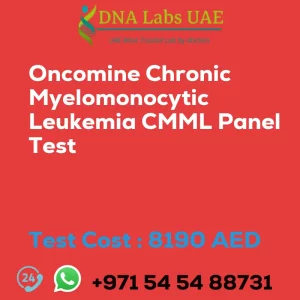IMMUNOHISTOCHEMISTRY CD21 Test – DNA Labs UAE
Test Name: IMMUNOHISTOCHEMISTRY CD21 Test
Components: CD21 protein detection
Price: 410.0 AED
Sample Condition: Submit tumor tissue in 10% Formal-saline OR Formalin fixed paraffin embedded block. Ship at room temperature. Provide a copy of the Histopathology report, Site of biopsy and Clinical history.
Report Delivery: Sample Daily by 6 pm; Report Block: 5 days Tissue Biopsy: 5 days Tissue large complex: 7 days
Method: Immunohistochemistry
Test Type: Cancer
Doctor: Oncologist, Pathologist
Test Department: DNA Labs UAE
Pre Test Information: Provide a copy of the Histopathology report, Site of biopsy and Clinical history.
Test Details
The CD21 test is an immunohistochemistry (IHC) test used to detect the presence of the CD21 protein in tissue samples. CD21, also known as complement receptor 2 (CR2), is a cell surface protein found on B cells, follicular dendritic cells, and some epithelial cells.
The CD21 test is commonly used in the diagnosis and classification of lymphomas, particularly follicular lymphoma and diffuse large B-cell lymphoma. It can also be used to differentiate between reactive lymphoid hyperplasia and lymphoma.
During the CD21 test, tissue samples are collected, fixed, and embedded in paraffin. Thin sections of the tissue are then placed on glass slides and treated with specific antibodies that bind to the CD21 protein. These antibodies are usually conjugated with a chromogen or a fluorescent dye, allowing for visualization under a microscope.
If the tissue sample contains cells expressing CD21, a brown color or fluorescence will be observed in the appropriate cells. This indicates the presence of CD21 and can help in the diagnosis and classification of lymphomas.
Overall, the CD21 test is a valuable tool in immunohistochemistry, allowing for the detection of the CD21 protein in tissue samples and aiding in the diagnosis and classification of lymphomas.
| Test Name | IMMUNOHISTOCHEMISTRY CD21 Test |
|---|---|
| Components | |
| Price | 410.0 AED |
| Sample Condition | Submit tumor tissue in 10% Formal-saline OR Formalin fixed paraffin embedded block. Ship at room temperature. Provide a copy of the Histopathology report, Site of biopsy and Clinical history. |
| Report Delivery | Sample Daily by 6 pm; Report Block: 5 days Tissue Biopsy: 5 days Tissue large complex : 7 days |
| Method | Immunohistochemistry |
| Test type | Cancer |
| Doctor | Oncologist, Pathologist |
| Test Department: | |
| Pre Test Information | Provide a copy of the Histopathology report, Site of biopsy and Clinical history. |
| Test Details |
The CD21 test is an immunohistochemistry (IHC) test used to detect the presence of the CD21 protein in tissue samples. CD21, also known as complement receptor 2 (CR2), is a cell surface protein found on B cells, follicular dendritic cells, and some epithelial cells. The CD21 test is commonly used in the diagnosis and classification of lymphomas, particularly follicular lymphoma and diffuse large B-cell lymphoma. It can also be used to differentiate between reactive lymphoid hyperplasia and lymphoma. During the CD21 test, tissue samples are collected, fixed, and embedded in paraffin. Thin sections of the tissue are then placed on glass slides and treated with specific antibodies that bind to the CD21 protein. These antibodies are usually conjugated with a chromogen or a fluorescent dye, allowing for visualization under a microscope. If the tissue sample contains cells expressing CD21, a brown color or fluorescence will be observed in the appropriate cells. This indicates the presence of CD21 and can help in the diagnosis and classification of lymphomas. Overall, the CD21 test is a valuable tool in immunohistochemistry, allowing for the detection of the CD21 protein in tissue samples and aiding in the diagnosis and classification of lymphomas. |








